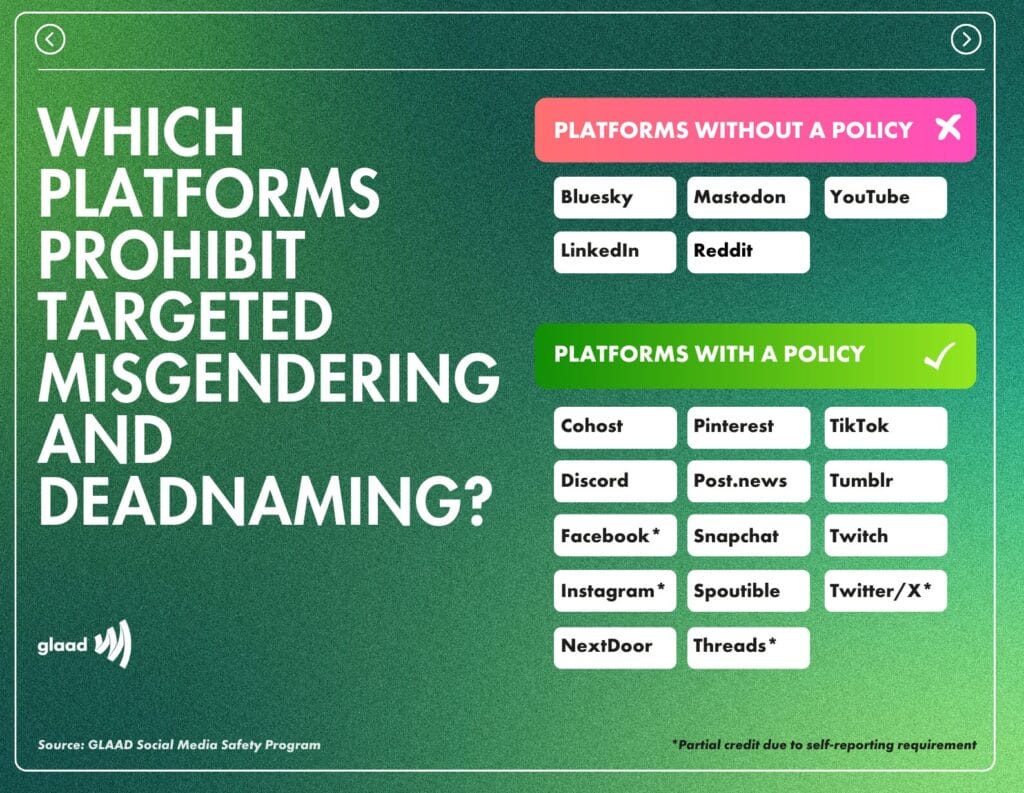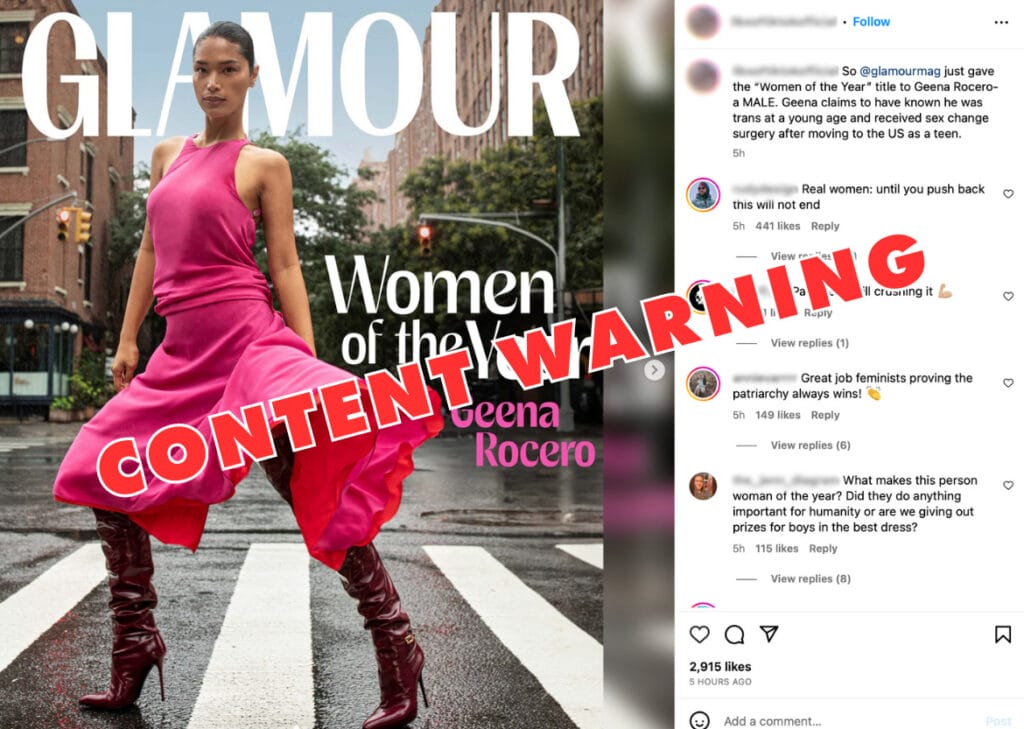Updated: March 4, 2024
As we’ve seen for the past several years, right-wing figures remain obsessed with bullying and harassing prominent transgender people across major social media platforms. As a way of boosting their own engagement and traffic via celebrity name-dropping, and as a vehicle for promoting general vehement animus towards all transgender people — these attacks most frequently take the form of targeted misgendering and deadnaming.
There are countless examples, but a September 2023 X/Twitter post (pictured below) by Canadian far-right pundit Jordan Peterson (repeatedly deadnaming actor Elliot Page) is an exemplary instance illustrating the malicious intent of the practice.
Thankfully, more platforms are taking proactive steps towards protecting their transgender and nonbinary users. In December 2023, three platforms took leadership in updating their policies. Discord added an express prohibition against targeted misgendering and deadnaming to its Hateful Conduct policy: “For example you may not post, share or engage in: Repeatedly using slurs to degrade and demean individuals or groups. This includes deadnaming or misgendering a transgender person.” And Post added the following to its Content Rules: “Specifically with respect to the LGBTQ+ community, denial of an individual’s gender identity or sexual orientation or promoting conversion therapy or related programs that attempt to change a person’s sexual orientation or gender identity are not allowed and will be considered a violation of the Content Rules.” Spoutible — a platform billed by some as a X/Twitter alternative — made a similar update to its policy in December 2023. (In addition, also as a result of GLAAD’s guidance, Post has now added a prohibition against so-called “conversion therapy” content). In January 2024, in response to key stakeholder guidance from GLAAD, IFTAS (the non-profit supporting the Fediverse moderator community) crafted sample policy language and implemented an “IFTAS LGBTQ+ Safety Server Pledge” system for the Fediverse, in which servers can sign-on confirming they have incorporated a policy provision prohibiting both targeted misgendering and deadnaming and the promotion of so-called “conversion therapy” content. And in February, Snapchat also added both prohibitions into its Hateful Content and Harmful False or Deceptive Information community guidelines policies.

Alongside inflammatory mischaracterizations of transgender healthcare and baseless assertions of trans and LGBTQ people being threats to children, the practice of targeted misgendering and deadnaming has emerged in recent years as one of the most common modalities for expressing contempt and hate toward trans and nonbinary people across all social media platforms.
The trope is extremely popular amongst high-follower anti-LGBTQ accounts and is especially utilized to bully, mock, and harass prominent trans public figures (Geena Rocero, Admiral Rachel Levine, Dylan Mulvaney, 16-year-old Zaya Wade to name a few). This strategy of targeting well-known people serves to escalate visibility and engagement on posts, while it also functions as a vehicle to express general hatred of trans and nonbinary people and the community as a whole.*
As is true with other hate-driven tropes, the far-right pundits, politicians, and accounts who engage in the practice tend to disingenuously feign that such expression is not hate speech, even as their animus is unmistakable, both from the posts themselves and from their clearly stated positions opposing the basic rights and dignity of trans and LGBTQ people. To be very clear — this isn’t about accidentally getting someone’s pronouns wrong or mistakenly mentioning their old name. This is hate speech pure and simple, designed to evade existing hate speech policies in multiple ways including exploiting policy loopholes like Meta’s public figures policy (see below).
A particularly egregious example of this practice is a July 2022 YouTube video in which far-right ideologue Jordan Peterson viciously misgenders and deadnames actor Elliot Page dozens of times in the course of a 15-minute rant. YouTube demonetized — but didn’t remove — the video, which has 3.5 million views, for violating its “advertising policies around hateful and derogatory content.” Peterson is known for his virulent anti-LGBTQ extremism. After Twitter’s April 2023 removal of their targeted misgendering and deadnaming policy, Peterson has continued his relentless childish bullying and harassment with ongoing posts targeting Page.
In July 2020, in response to being relentlessly targeted online with misgendering, U.S. DHS Assistant Secretary for Health, Admiral Rachel Levine succinctly characterized such attacks as “intolerance and discrimination against LGBTQ individuals, and specifically transgender individuals.”
“It’s an attempt to bully us; it is abusive; it is harassment,” trans attorney and Harvard Cyberlaw Clinic instructor Alejandra Caraballo explained last year to Reuters.

The Current State of Policies on the Major Platforms and the Need for Closing the Public Figure Policy Loophole
Currently, of the six major platforms – TikTok, YouTube, X/Twitter, and Meta’s Facebook, Instagram and Threads – only TikTok expressly prohibits targeted misgendering and deadnaming in its hate and harassment policy. While for Meta’s Facebook, Instagram, and Threads platforms, tier 3 of Meta’s Bullying and Harassment policy explains: “… all private minors, private adults (who must self-report), and minor involuntary public figures are protected from … Claims about romantic involvement, sexual orientation or gender identity.” Though it requires direct reporting by the individual user, clearly the policy can be interpreted to cover both targeted misgendering and deadnaming, which involve “claims about a person’s gender identity.”
In addition to the self-reporting requirement, unfortunately this policy also does not apply to public figures, a loophole which leaves transgender notables unprotected and allows anti-trans hate accounts to target them as a way of expressing general anti-trans animus (as seen in the November Instagram example above).
GLAAD’s Social Media Safety program recommendation is that Meta and other platforms must close these loopholes. There is a parallel with Meta’s development of their Holocaust denial policy (which was implemented in October 2020, after years of guidance and input from advocacy groups and subsequent to CEO Zuckerberg’s July 2018 statement in an interview with journalist Kara Swisher about Holocaust denial content that “at the end of the day, I don’t believe that our platform should take that down”). While it took many years for Facebook to finally adopt the policy, recognizing such content as hate speech, it has always been very clear that Holocaust denial is antisemitism. It is just a creative form of it. As is true of other creative hate and dog whistle content, targeted misgendering and deadnaming of public figures is quite obviously anti-trans hate speech.
In 2021, GLAAD joined Media Matters for America and 18 other organizations in calling for YouTube to add such a prohibition to its hate speech policy. In a March 2023 Google Civil Rights Audit, consultants at WilmerHale conveyed similar guidance to Google, advising that:
YouTube’s policies do not on their face prohibit intentional misgendering or deadnaming of individuals. Both acts have the potential to create an unsafe environment for users and real-world harm. We recommend Google review its policies to ensure it is appropriately addressing issues such as the intentional misgendering or deadnaming of individuals and continue to regularly review its hate and harassment policies to adapt to changing norms regarding protected groups.
X (when it was known as Twitter) first enacted its explicit policy against targeted misgendering and deadnaming in 2018, but removed it in April 2023. The company’s increasingly worrying policy and product decisions since Elon Musk’s acquisition includes Musk’s own personal, extensive anti-LGBTQ posts and anti-trans comments on the platform which, according to observers, revealed him to be a far-right hate-driven extremist. His many changes to the platform have proved to be disastrous for business with revenue plummeting as creators and advertisers, and users in general, continue to flee the platform. As Free Press co-CEO and Stop Toxic Twitter campaign co-lead Jessica Gonzalez put it, Musk is sending X/Twitter into “a death spiral as hundreds of advertisers have joined the mass exodus from the platform.”
Curiously, in January 2024 X quietly re-introduced a modified targeted misgendering and deadnaming policy — adding a new clause to its harassment policy regarding “Use of Prior Names and Pronouns:” “We will reduce the visibility of posts that purposefully use different pronouns to address someone other than what that person uses for themselves, or that use a previous name that someone no longer goes by as part of their transition. Given the complexity of determining whether such a violation has occurred, we must always hear from the target to determine if a violation has occurred.” While this clearly indicates that mitigations will be applied to violative content, like Meta’s policy it requires self-reporting thereby putting the burden on the user.
In yet another twist, X amended the policy in early March 2024 with the prefatory caveat: “Where required by local laws…”
Other platforms that include a prohibition against targeted misgendering and deadnaming in their hateful conduct policies include Tumblr, Pinterest, and NextDoor to name a few. While Twitch community guidelines expressly prohibit: “Intentionally referring to someone using a pronoun or form of address that does not correctly reflect the gender with which they identify, such as repeating incorrect pronouns after being asked to stop.” And now, as of February 2024, Discord, Post, Spoutible, Snap, and IFTAS also maintain such policies.
The IFTAS policy announcement explains the rationale behind such policies: “Due to the widespread and insidious nature of expressing anti-transgender sentiments in bad faith, it’s imperative to have specific policy addressing this issue. This approach is considered a best practice for two key reasons: it offers clear guidance to users, and it assists moderators in recognizing and understanding the intent behind such statements. It’s important to reiterate that the focus is not about accidentally getting someone’s pronouns wrong. Rather, our concern centers on deliberate and targeted acts of hate and harassment.”

All Platforms Should Adopt Policies That Truly Protect Transgender Users
Every major social media platform has policies against hate speech, generally defined as content that attacks or promotes violence or hatred against groups on the basis of protected characteristics, including race, religion, gender, disability, sexual orientation, gender identity, and more. As has been well-documented by researchers, hate speech online has been linked to a global rise in real-world violence impacting historically marginalized communities.
The practice of targeted misgendering and deadnaming has been identified by the Anti-Defamation League (ADL) and other civil society groups, including GLAAD and Media Matters, as a form of hate speech. Social media companies committed to maintaining safe environments for trans and nonbinary people should be able to recognize this targeted harassing and abusive behavior as harassment and abuse, and should enforce their policies accordingly.
It is also vitally important to note that even when platforms do not have express prohibitions against targeted misgendering and deadnaming, such behaviors by definition violate existing general hateful conduct policies which protect against hate and harassment on the basis of protected characteristics, including gender identity.
That said, in the 2023 annual Social Media Safety Index report GLAAD urged all platforms to incorporate into their hateful conduct policies an explicit prohibition against targeted misgendering and deadnaming of transgender and nonbinary people. This recommendation remains an especially high priority in our current landscape where anti-trans online rhetoric and attacks are so prevalent, vicious, and harmful — and where we also see such an offline onslaught targeting the trans community, ranging from hundreds of bills in state legislatures seeking to retract basic rights to threats (and acts) of physical violence.
The 2024 GLAAD Social Media Safety Index will be released this coming summer.
Leanna Garfield is Manager of the GLAAD Social Media Safety program and Jenni Olson is the Senior Director. An earlier version of this article (Understanding Targeted Misgendering and Deadnaming as Hate Speech) was published by Tech Policy Press.
– – –
*A 2022 report from GLAAD, UltraViolet, Kairos, and the Women’s March (From URL to IRL: The Impact of Social Media on People of Color, Women, and LGBTQ+ Communities – We Are UltraViolet) shows that 60% of LGBTQ people feel harmed not only from experiencing harassment and hate directed against them personally, but also from witnessing hate and harassment of other LGBTQ community members such as celebrities and public figures. Clearly, directing hate against trans notables is used as a vehicle for expressing general anti-trans bigotry and hate. When companies maintain policy loopholes that allow such targeting of public figures (as does Meta for instance), this perpetuates harm against entire communities.












